Nursing Care for Anorexia
VerifiedAdded on 2023/06/04
|9
|1667
|444
AI Summary
This article discusses the nursing care provided to a patient with anorexia nervosa, including the importance of medication and therapy, and the evidence supporting these aspects. The article emphasizes the need for involving the family in therapy and monitoring electrolyte imbalances. The author also reflects on their experience administering medication and engaging the patient in therapy. References are provided to support the evidence presented.
Contribute Materials
Your contribution can guide someone’s learning journey. Share your
documents today.
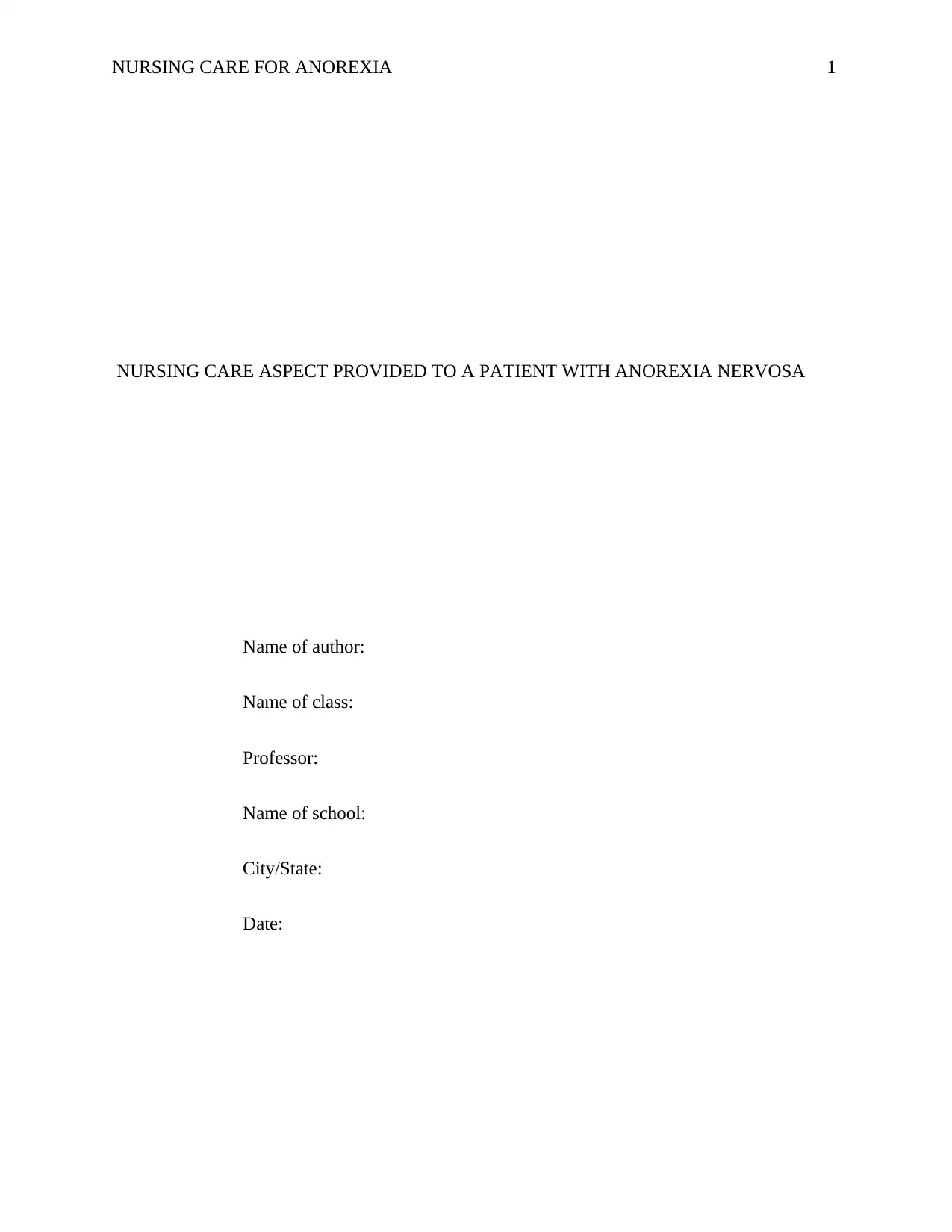
NURSING CARE FOR ANOREXIA 1
NURSING CARE ASPECT PROVIDED TO A PATIENT WITH ANOREXIA NERVOSA
Name of author:
Name of class:
Professor:
Name of school:
City/State:
Date:
NURSING CARE ASPECT PROVIDED TO A PATIENT WITH ANOREXIA NERVOSA
Name of author:
Name of class:
Professor:
Name of school:
City/State:
Date:
Secure Best Marks with AI Grader
Need help grading? Try our AI Grader for instant feedback on your assignments.
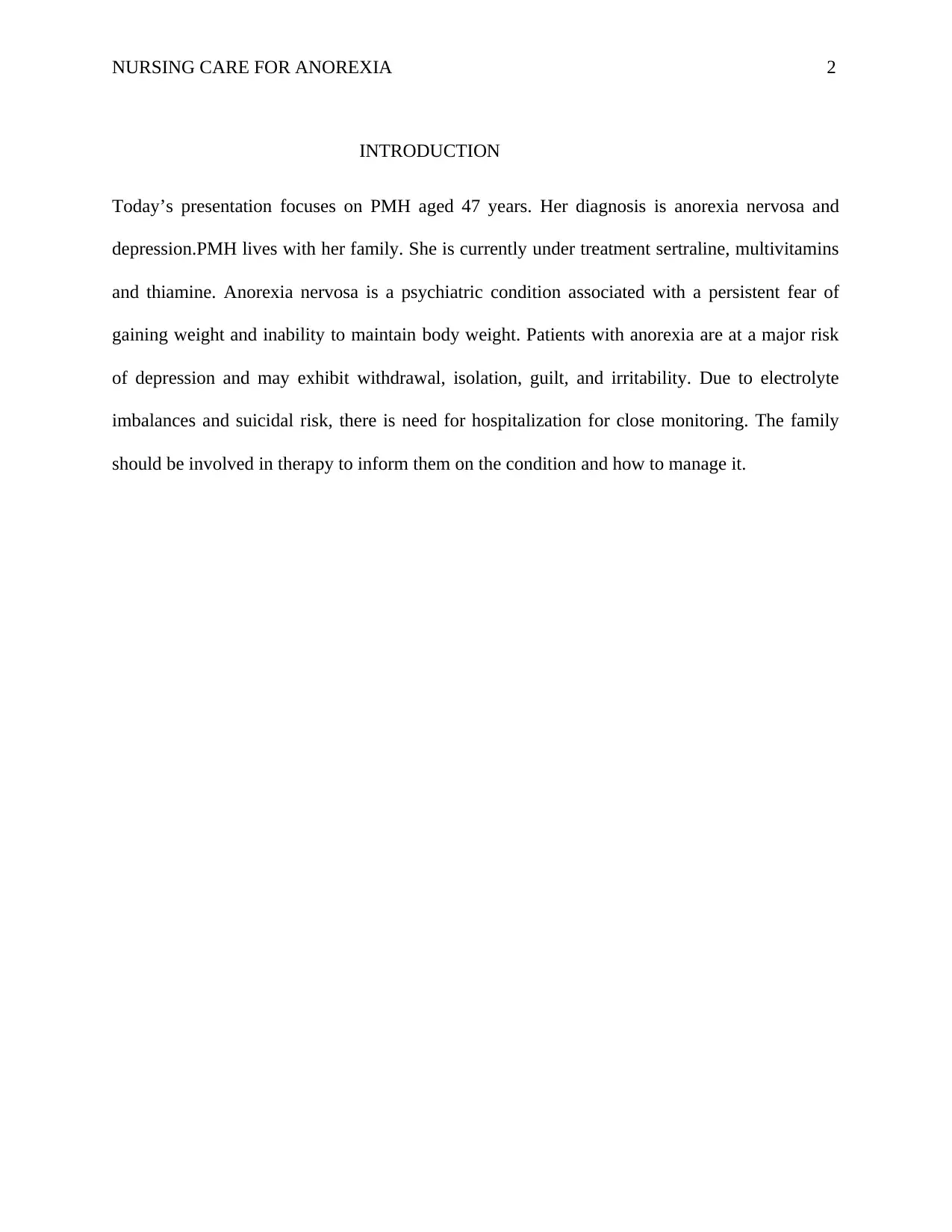
NURSING CARE FOR ANOREXIA 2
INTRODUCTION
Today’s presentation focuses on PMH aged 47 years. Her diagnosis is anorexia nervosa and
depression.PMH lives with her family. She is currently under treatment sertraline, multivitamins
and thiamine. Anorexia nervosa is a psychiatric condition associated with a persistent fear of
gaining weight and inability to maintain body weight. Patients with anorexia are at a major risk
of depression and may exhibit withdrawal, isolation, guilt, and irritability. Due to electrolyte
imbalances and suicidal risk, there is need for hospitalization for close monitoring. The family
should be involved in therapy to inform them on the condition and how to manage it.
INTRODUCTION
Today’s presentation focuses on PMH aged 47 years. Her diagnosis is anorexia nervosa and
depression.PMH lives with her family. She is currently under treatment sertraline, multivitamins
and thiamine. Anorexia nervosa is a psychiatric condition associated with a persistent fear of
gaining weight and inability to maintain body weight. Patients with anorexia are at a major risk
of depression and may exhibit withdrawal, isolation, guilt, and irritability. Due to electrolyte
imbalances and suicidal risk, there is need for hospitalization for close monitoring. The family
should be involved in therapy to inform them on the condition and how to manage it.
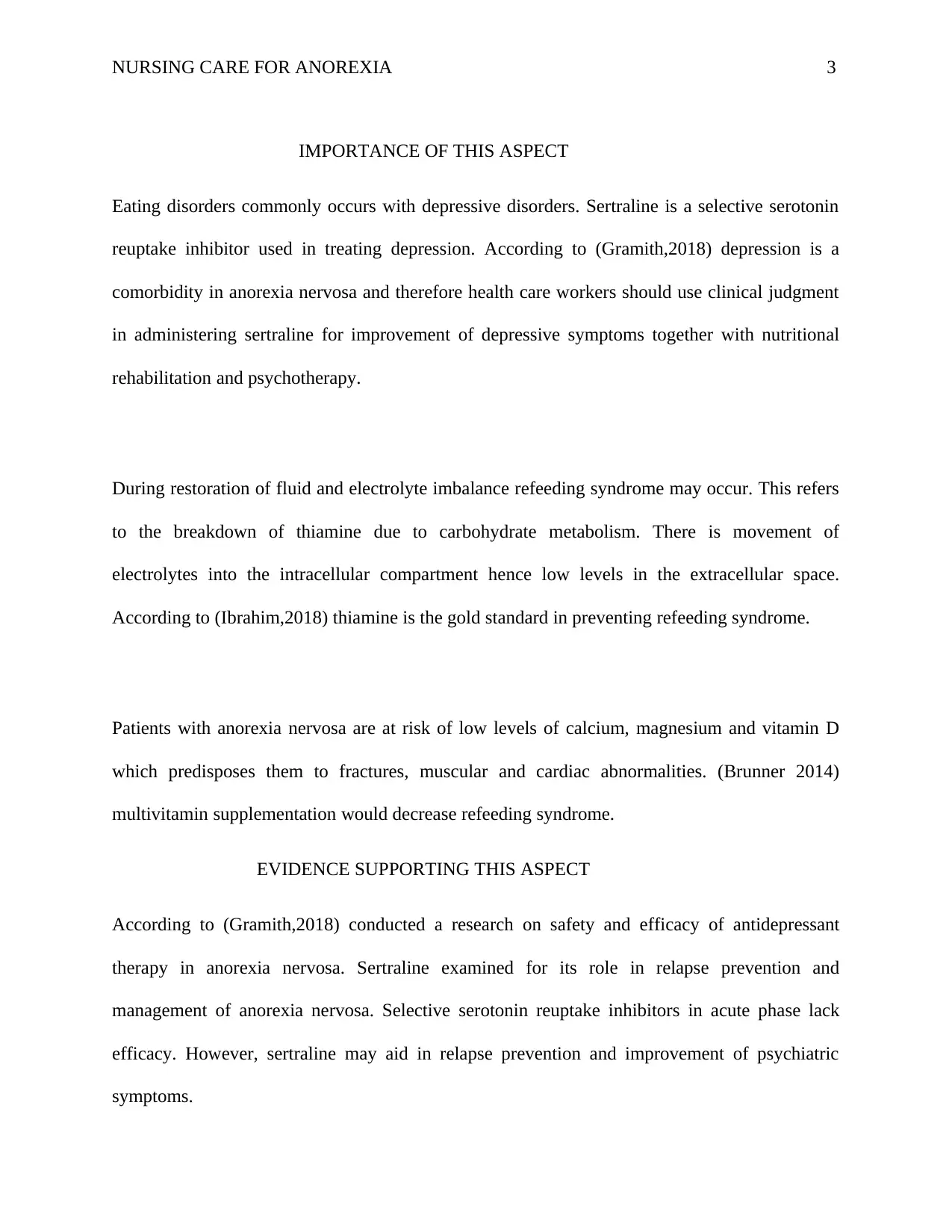
NURSING CARE FOR ANOREXIA 3
IMPORTANCE OF THIS ASPECT
Eating disorders commonly occurs with depressive disorders. Sertraline is a selective serotonin
reuptake inhibitor used in treating depression. According to (Gramith,2018) depression is a
comorbidity in anorexia nervosa and therefore health care workers should use clinical judgment
in administering sertraline for improvement of depressive symptoms together with nutritional
rehabilitation and psychotherapy.
During restoration of fluid and electrolyte imbalance refeeding syndrome may occur. This refers
to the breakdown of thiamine due to carbohydrate metabolism. There is movement of
electrolytes into the intracellular compartment hence low levels in the extracellular space.
According to (Ibrahim,2018) thiamine is the gold standard in preventing refeeding syndrome.
Patients with anorexia nervosa are at risk of low levels of calcium, magnesium and vitamin D
which predisposes them to fractures, muscular and cardiac abnormalities. (Brunner 2014)
multivitamin supplementation would decrease refeeding syndrome.
EVIDENCE SUPPORTING THIS ASPECT
According to (Gramith,2018) conducted a research on safety and efficacy of antidepressant
therapy in anorexia nervosa. Sertraline examined for its role in relapse prevention and
management of anorexia nervosa. Selective serotonin reuptake inhibitors in acute phase lack
efficacy. However, sertraline may aid in relapse prevention and improvement of psychiatric
symptoms.
IMPORTANCE OF THIS ASPECT
Eating disorders commonly occurs with depressive disorders. Sertraline is a selective serotonin
reuptake inhibitor used in treating depression. According to (Gramith,2018) depression is a
comorbidity in anorexia nervosa and therefore health care workers should use clinical judgment
in administering sertraline for improvement of depressive symptoms together with nutritional
rehabilitation and psychotherapy.
During restoration of fluid and electrolyte imbalance refeeding syndrome may occur. This refers
to the breakdown of thiamine due to carbohydrate metabolism. There is movement of
electrolytes into the intracellular compartment hence low levels in the extracellular space.
According to (Ibrahim,2018) thiamine is the gold standard in preventing refeeding syndrome.
Patients with anorexia nervosa are at risk of low levels of calcium, magnesium and vitamin D
which predisposes them to fractures, muscular and cardiac abnormalities. (Brunner 2014)
multivitamin supplementation would decrease refeeding syndrome.
EVIDENCE SUPPORTING THIS ASPECT
According to (Gramith,2018) conducted a research on safety and efficacy of antidepressant
therapy in anorexia nervosa. Sertraline examined for its role in relapse prevention and
management of anorexia nervosa. Selective serotonin reuptake inhibitors in acute phase lack
efficacy. However, sertraline may aid in relapse prevention and improvement of psychiatric
symptoms.
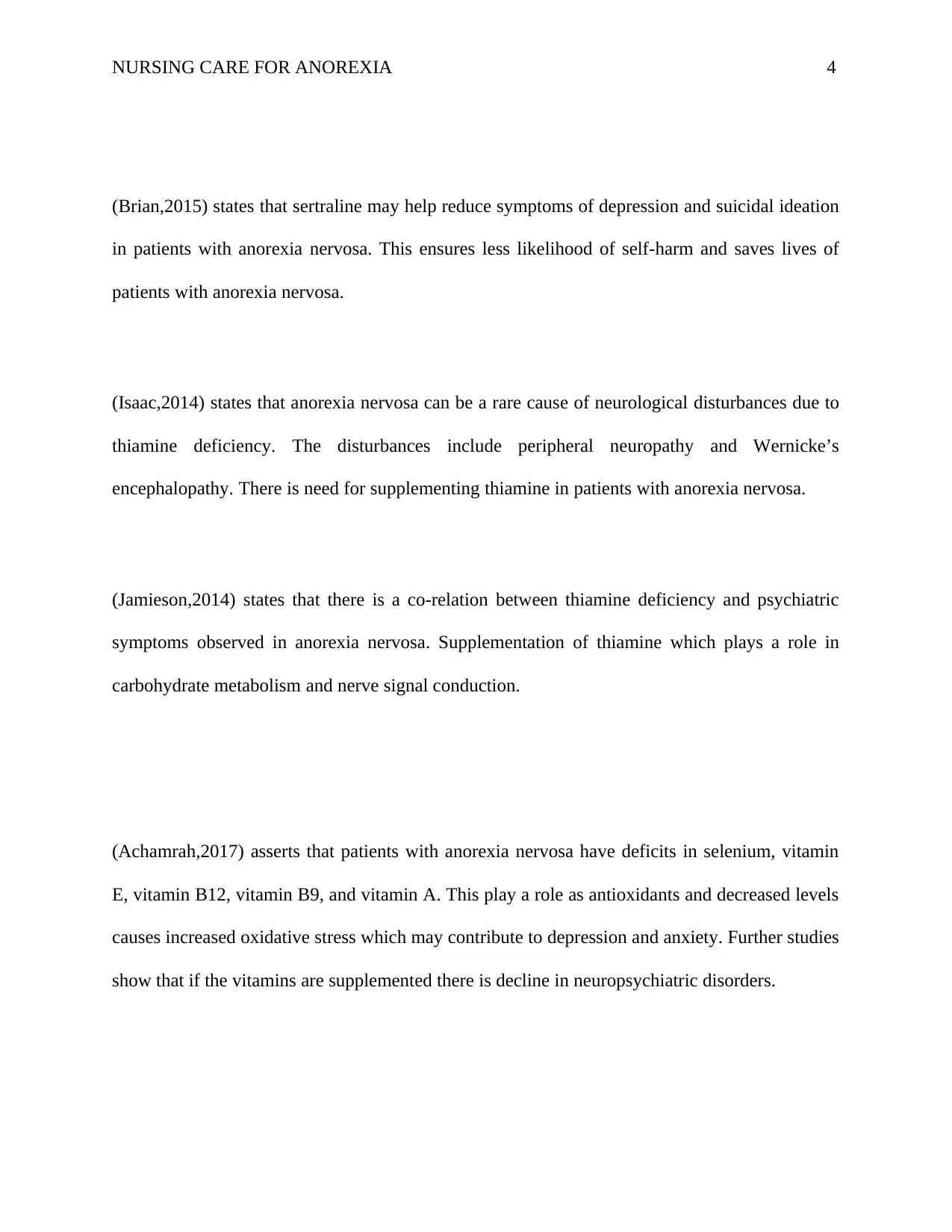
NURSING CARE FOR ANOREXIA 4
(Brian,2015) states that sertraline may help reduce symptoms of depression and suicidal ideation
in patients with anorexia nervosa. This ensures less likelihood of self-harm and saves lives of
patients with anorexia nervosa.
(Isaac,2014) states that anorexia nervosa can be a rare cause of neurological disturbances due to
thiamine deficiency. The disturbances include peripheral neuropathy and Wernicke’s
encephalopathy. There is need for supplementing thiamine in patients with anorexia nervosa.
(Jamieson,2014) states that there is a co-relation between thiamine deficiency and psychiatric
symptoms observed in anorexia nervosa. Supplementation of thiamine which plays a role in
carbohydrate metabolism and nerve signal conduction.
(Achamrah,2017) asserts that patients with anorexia nervosa have deficits in selenium, vitamin
E, vitamin B12, vitamin B9, and vitamin A. This play a role as antioxidants and decreased levels
causes increased oxidative stress which may contribute to depression and anxiety. Further studies
show that if the vitamins are supplemented there is decline in neuropsychiatric disorders.
(Brian,2015) states that sertraline may help reduce symptoms of depression and suicidal ideation
in patients with anorexia nervosa. This ensures less likelihood of self-harm and saves lives of
patients with anorexia nervosa.
(Isaac,2014) states that anorexia nervosa can be a rare cause of neurological disturbances due to
thiamine deficiency. The disturbances include peripheral neuropathy and Wernicke’s
encephalopathy. There is need for supplementing thiamine in patients with anorexia nervosa.
(Jamieson,2014) states that there is a co-relation between thiamine deficiency and psychiatric
symptoms observed in anorexia nervosa. Supplementation of thiamine which plays a role in
carbohydrate metabolism and nerve signal conduction.
(Achamrah,2017) asserts that patients with anorexia nervosa have deficits in selenium, vitamin
E, vitamin B12, vitamin B9, and vitamin A. This play a role as antioxidants and decreased levels
causes increased oxidative stress which may contribute to depression and anxiety. Further studies
show that if the vitamins are supplemented there is decline in neuropsychiatric disorders.
Paraphrase This Document
Need a fresh take? Get an instant paraphrase of this document with our AI Paraphraser
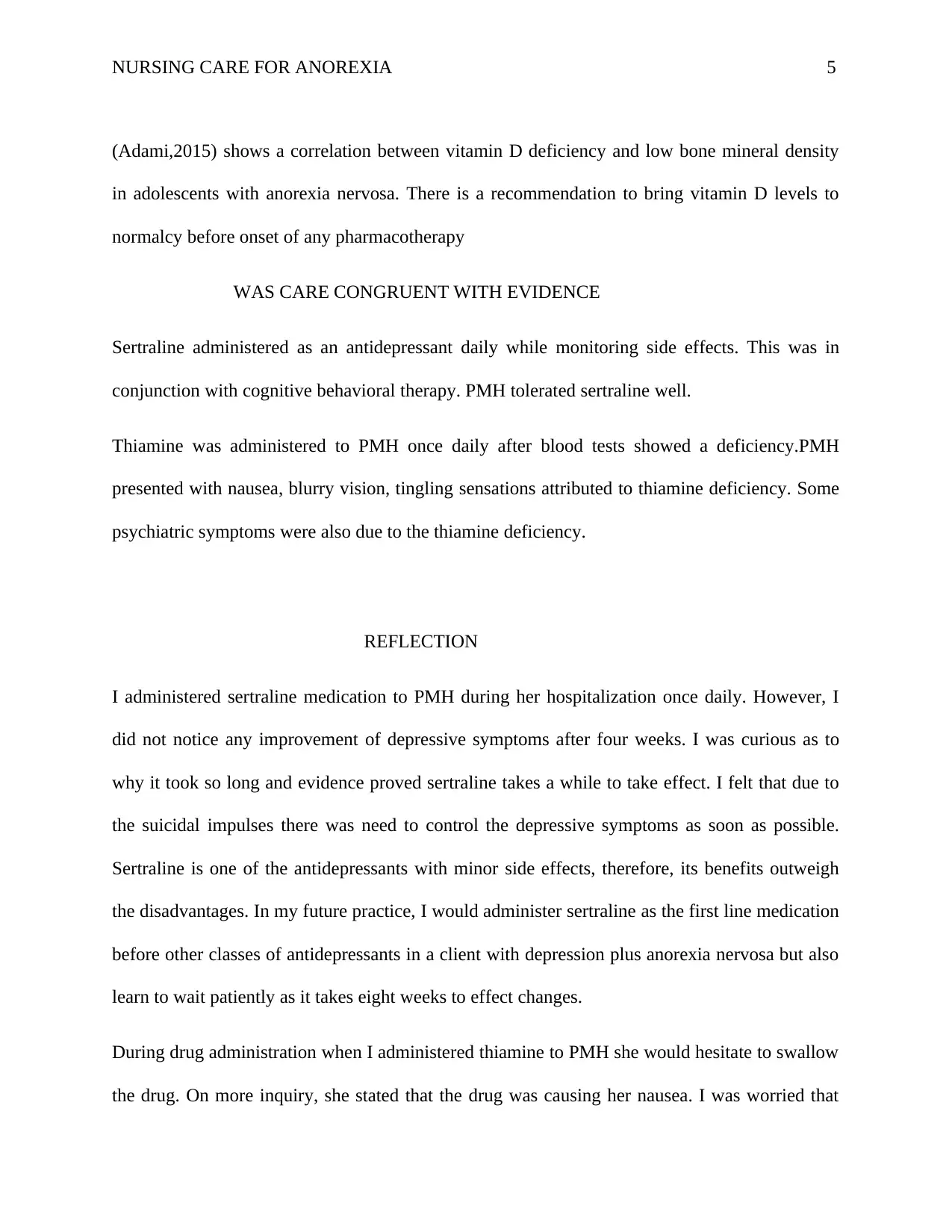
NURSING CARE FOR ANOREXIA 5
(Adami,2015) shows a correlation between vitamin D deficiency and low bone mineral density
in adolescents with anorexia nervosa. There is a recommendation to bring vitamin D levels to
normalcy before onset of any pharmacotherapy
WAS CARE CONGRUENT WITH EVIDENCE
Sertraline administered as an antidepressant daily while monitoring side effects. This was in
conjunction with cognitive behavioral therapy. PMH tolerated sertraline well.
Thiamine was administered to PMH once daily after blood tests showed a deficiency.PMH
presented with nausea, blurry vision, tingling sensations attributed to thiamine deficiency. Some
psychiatric symptoms were also due to the thiamine deficiency.
REFLECTION
I administered sertraline medication to PMH during her hospitalization once daily. However, I
did not notice any improvement of depressive symptoms after four weeks. I was curious as to
why it took so long and evidence proved sertraline takes a while to take effect. I felt that due to
the suicidal impulses there was need to control the depressive symptoms as soon as possible.
Sertraline is one of the antidepressants with minor side effects, therefore, its benefits outweigh
the disadvantages. In my future practice, I would administer sertraline as the first line medication
before other classes of antidepressants in a client with depression plus anorexia nervosa but also
learn to wait patiently as it takes eight weeks to effect changes.
During drug administration when I administered thiamine to PMH she would hesitate to swallow
the drug. On more inquiry, she stated that the drug was causing her nausea. I was worried that
(Adami,2015) shows a correlation between vitamin D deficiency and low bone mineral density
in adolescents with anorexia nervosa. There is a recommendation to bring vitamin D levels to
normalcy before onset of any pharmacotherapy
WAS CARE CONGRUENT WITH EVIDENCE
Sertraline administered as an antidepressant daily while monitoring side effects. This was in
conjunction with cognitive behavioral therapy. PMH tolerated sertraline well.
Thiamine was administered to PMH once daily after blood tests showed a deficiency.PMH
presented with nausea, blurry vision, tingling sensations attributed to thiamine deficiency. Some
psychiatric symptoms were also due to the thiamine deficiency.
REFLECTION
I administered sertraline medication to PMH during her hospitalization once daily. However, I
did not notice any improvement of depressive symptoms after four weeks. I was curious as to
why it took so long and evidence proved sertraline takes a while to take effect. I felt that due to
the suicidal impulses there was need to control the depressive symptoms as soon as possible.
Sertraline is one of the antidepressants with minor side effects, therefore, its benefits outweigh
the disadvantages. In my future practice, I would administer sertraline as the first line medication
before other classes of antidepressants in a client with depression plus anorexia nervosa but also
learn to wait patiently as it takes eight weeks to effect changes.
During drug administration when I administered thiamine to PMH she would hesitate to swallow
the drug. On more inquiry, she stated that the drug was causing her nausea. I was worried that
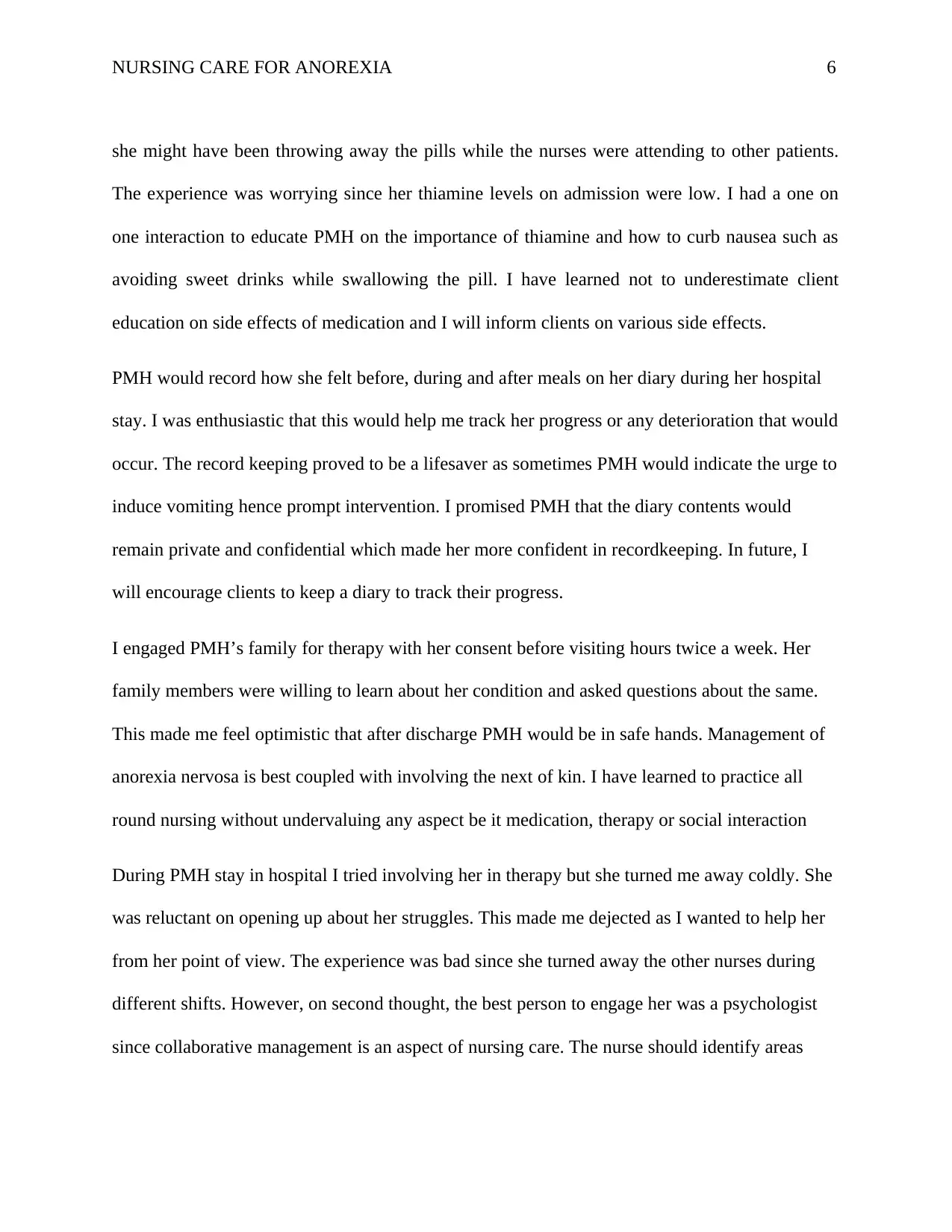
NURSING CARE FOR ANOREXIA 6
she might have been throwing away the pills while the nurses were attending to other patients.
The experience was worrying since her thiamine levels on admission were low. I had a one on
one interaction to educate PMH on the importance of thiamine and how to curb nausea such as
avoiding sweet drinks while swallowing the pill. I have learned not to underestimate client
education on side effects of medication and I will inform clients on various side effects.
PMH would record how she felt before, during and after meals on her diary during her hospital
stay. I was enthusiastic that this would help me track her progress or any deterioration that would
occur. The record keeping proved to be a lifesaver as sometimes PMH would indicate the urge to
induce vomiting hence prompt intervention. I promised PMH that the diary contents would
remain private and confidential which made her more confident in recordkeeping. In future, I
will encourage clients to keep a diary to track their progress.
I engaged PMH’s family for therapy with her consent before visiting hours twice a week. Her
family members were willing to learn about her condition and asked questions about the same.
This made me feel optimistic that after discharge PMH would be in safe hands. Management of
anorexia nervosa is best coupled with involving the next of kin. I have learned to practice all
round nursing without undervaluing any aspect be it medication, therapy or social interaction
During PMH stay in hospital I tried involving her in therapy but she turned me away coldly. She
was reluctant on opening up about her struggles. This made me dejected as I wanted to help her
from her point of view. The experience was bad since she turned away the other nurses during
different shifts. However, on second thought, the best person to engage her was a psychologist
since collaborative management is an aspect of nursing care. The nurse should identify areas
she might have been throwing away the pills while the nurses were attending to other patients.
The experience was worrying since her thiamine levels on admission were low. I had a one on
one interaction to educate PMH on the importance of thiamine and how to curb nausea such as
avoiding sweet drinks while swallowing the pill. I have learned not to underestimate client
education on side effects of medication and I will inform clients on various side effects.
PMH would record how she felt before, during and after meals on her diary during her hospital
stay. I was enthusiastic that this would help me track her progress or any deterioration that would
occur. The record keeping proved to be a lifesaver as sometimes PMH would indicate the urge to
induce vomiting hence prompt intervention. I promised PMH that the diary contents would
remain private and confidential which made her more confident in recordkeeping. In future, I
will encourage clients to keep a diary to track their progress.
I engaged PMH’s family for therapy with her consent before visiting hours twice a week. Her
family members were willing to learn about her condition and asked questions about the same.
This made me feel optimistic that after discharge PMH would be in safe hands. Management of
anorexia nervosa is best coupled with involving the next of kin. I have learned to practice all
round nursing without undervaluing any aspect be it medication, therapy or social interaction
During PMH stay in hospital I tried involving her in therapy but she turned me away coldly. She
was reluctant on opening up about her struggles. This made me dejected as I wanted to help her
from her point of view. The experience was bad since she turned away the other nurses during
different shifts. However, on second thought, the best person to engage her was a psychologist
since collaborative management is an aspect of nursing care. The nurse should identify areas
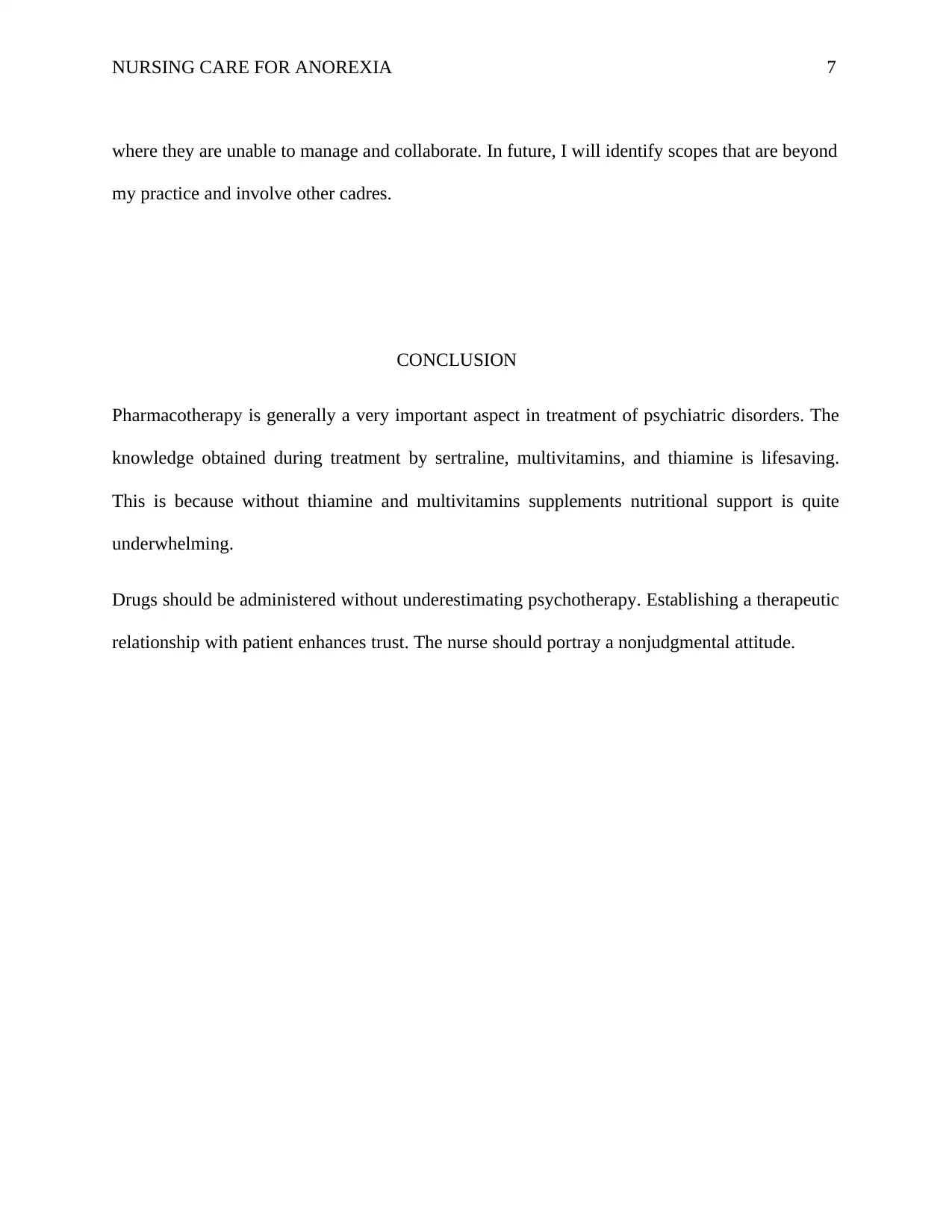
NURSING CARE FOR ANOREXIA 7
where they are unable to manage and collaborate. In future, I will identify scopes that are beyond
my practice and involve other cadres.
CONCLUSION
Pharmacotherapy is generally a very important aspect in treatment of psychiatric disorders. The
knowledge obtained during treatment by sertraline, multivitamins, and thiamine is lifesaving.
This is because without thiamine and multivitamins supplements nutritional support is quite
underwhelming.
Drugs should be administered without underestimating psychotherapy. Establishing a therapeutic
relationship with patient enhances trust. The nurse should portray a nonjudgmental attitude.
where they are unable to manage and collaborate. In future, I will identify scopes that are beyond
my practice and involve other cadres.
CONCLUSION
Pharmacotherapy is generally a very important aspect in treatment of psychiatric disorders. The
knowledge obtained during treatment by sertraline, multivitamins, and thiamine is lifesaving.
This is because without thiamine and multivitamins supplements nutritional support is quite
underwhelming.
Drugs should be administered without underestimating psychotherapy. Establishing a therapeutic
relationship with patient enhances trust. The nurse should portray a nonjudgmental attitude.
Secure Best Marks with AI Grader
Need help grading? Try our AI Grader for instant feedback on your assignments.
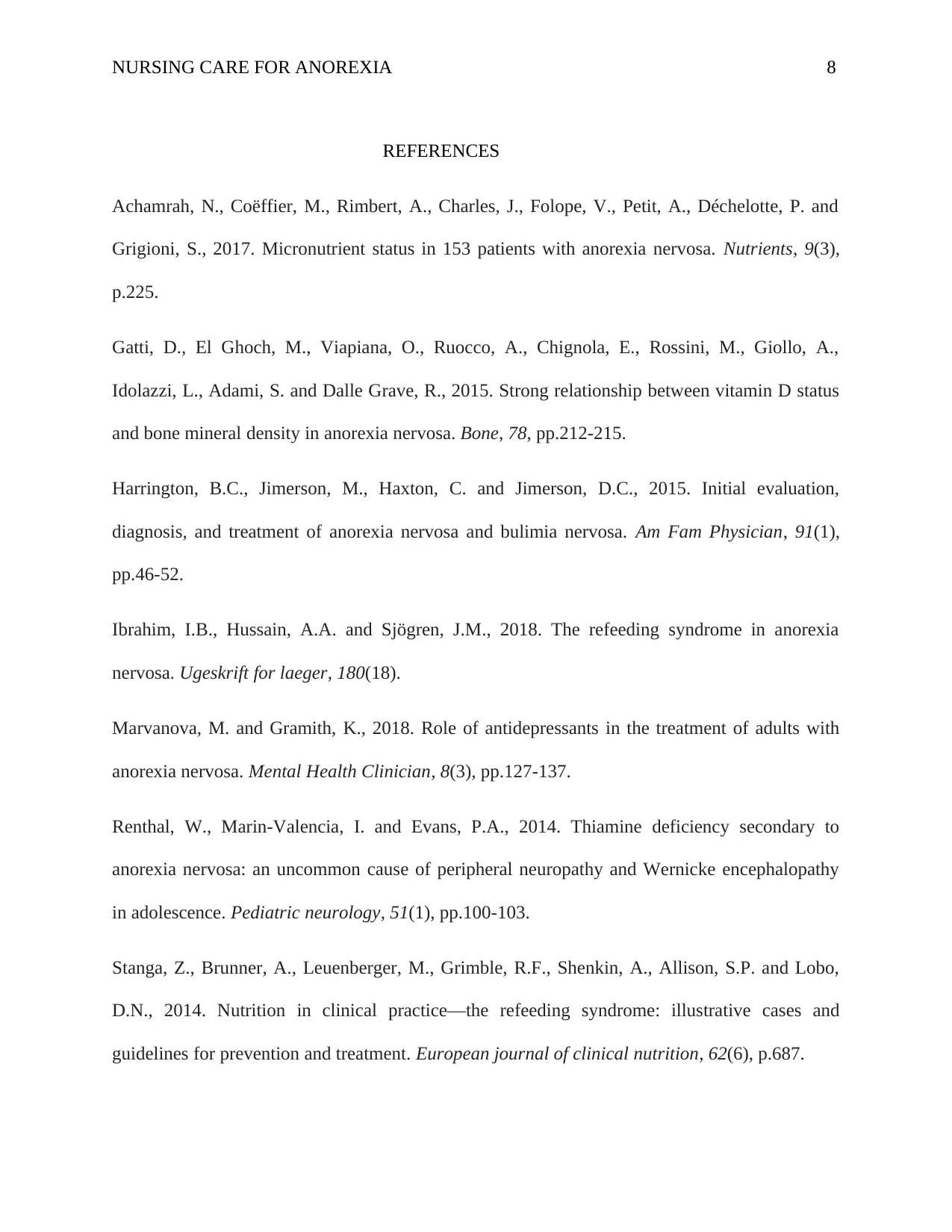
NURSING CARE FOR ANOREXIA 8
REFERENCES
Achamrah, N., Coëffier, M., Rimbert, A., Charles, J., Folope, V., Petit, A., Déchelotte, P. and
Grigioni, S., 2017. Micronutrient status in 153 patients with anorexia nervosa. Nutrients, 9(3),
p.225.
Gatti, D., El Ghoch, M., Viapiana, O., Ruocco, A., Chignola, E., Rossini, M., Giollo, A.,
Idolazzi, L., Adami, S. and Dalle Grave, R., 2015. Strong relationship between vitamin D status
and bone mineral density in anorexia nervosa. Bone, 78, pp.212-215.
Harrington, B.C., Jimerson, M., Haxton, C. and Jimerson, D.C., 2015. Initial evaluation,
diagnosis, and treatment of anorexia nervosa and bulimia nervosa. Am Fam Physician, 91(1),
pp.46-52.
Ibrahim, I.B., Hussain, A.A. and Sjögren, J.M., 2018. The refeeding syndrome in anorexia
nervosa. Ugeskrift for laeger, 180(18).
Marvanova, M. and Gramith, K., 2018. Role of antidepressants in the treatment of adults with
anorexia nervosa. Mental Health Clinician, 8(3), pp.127-137.
Renthal, W., Marin-Valencia, I. and Evans, P.A., 2014. Thiamine deficiency secondary to
anorexia nervosa: an uncommon cause of peripheral neuropathy and Wernicke encephalopathy
in adolescence. Pediatric neurology, 51(1), pp.100-103.
Stanga, Z., Brunner, A., Leuenberger, M., Grimble, R.F., Shenkin, A., Allison, S.P. and Lobo,
D.N., 2014. Nutrition in clinical practice—the refeeding syndrome: illustrative cases and
guidelines for prevention and treatment. European journal of clinical nutrition, 62(6), p.687.
REFERENCES
Achamrah, N., Coëffier, M., Rimbert, A., Charles, J., Folope, V., Petit, A., Déchelotte, P. and
Grigioni, S., 2017. Micronutrient status in 153 patients with anorexia nervosa. Nutrients, 9(3),
p.225.
Gatti, D., El Ghoch, M., Viapiana, O., Ruocco, A., Chignola, E., Rossini, M., Giollo, A.,
Idolazzi, L., Adami, S. and Dalle Grave, R., 2015. Strong relationship between vitamin D status
and bone mineral density in anorexia nervosa. Bone, 78, pp.212-215.
Harrington, B.C., Jimerson, M., Haxton, C. and Jimerson, D.C., 2015. Initial evaluation,
diagnosis, and treatment of anorexia nervosa and bulimia nervosa. Am Fam Physician, 91(1),
pp.46-52.
Ibrahim, I.B., Hussain, A.A. and Sjögren, J.M., 2018. The refeeding syndrome in anorexia
nervosa. Ugeskrift for laeger, 180(18).
Marvanova, M. and Gramith, K., 2018. Role of antidepressants in the treatment of adults with
anorexia nervosa. Mental Health Clinician, 8(3), pp.127-137.
Renthal, W., Marin-Valencia, I. and Evans, P.A., 2014. Thiamine deficiency secondary to
anorexia nervosa: an uncommon cause of peripheral neuropathy and Wernicke encephalopathy
in adolescence. Pediatric neurology, 51(1), pp.100-103.
Stanga, Z., Brunner, A., Leuenberger, M., Grimble, R.F., Shenkin, A., Allison, S.P. and Lobo,
D.N., 2014. Nutrition in clinical practice—the refeeding syndrome: illustrative cases and
guidelines for prevention and treatment. European journal of clinical nutrition, 62(6), p.687.

NURSING CARE FOR ANOREXIA 9
Winston, A.P., Jamieson, C.P., Madira, W., Gatward, N.M. and Palmer, R.L., 2014. Prevalence
of thiamin deficiency in anorexia nervosa. International Journal of Eating Disorders, 28(4),
pp.451-454.
Winston, A.P., Jamieson, C.P., Madira, W., Gatward, N.M. and Palmer, R.L., 2014. Prevalence
of thiamin deficiency in anorexia nervosa. International Journal of Eating Disorders, 28(4),
pp.451-454.
1 out of 9
Your All-in-One AI-Powered Toolkit for Academic Success.
+13062052269
info@desklib.com
Available 24*7 on WhatsApp / Email
![[object Object]](/_next/static/media/star-bottom.7253800d.svg)
Unlock your academic potential
© 2024 | Zucol Services PVT LTD | All rights reserved.
